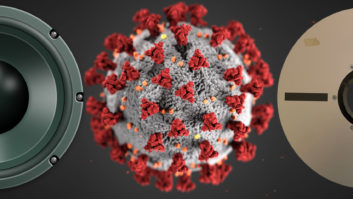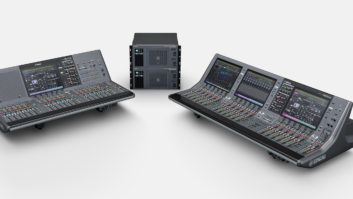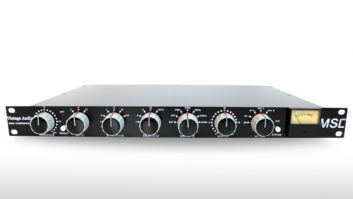Washington, DC (March 20, 2020)—On March 14, Joe McGrath got a phone call that confirmed his worst fears. Soon after, an email arrived, repeating the same bad news: “This is verification of your positive COVID-19 test result. You should stay in quarantine in your home until cleared by the Fairfax County Health Department.” And yet, recovering from COVID-19 has proven to be far more difficult than simply staying home.
Five days earlier, on March 9, the 34-year-old freelancer noticed he had a scratchy throat, but like many in the live sound industry, McGrath had bigger things to worry about. Gig after gig had cancelled in recent days, all due to the novel coronavirus’ spread, bringing his schedule to a screeching halt after a hectic winter. Usually in high demand, he’d worked throughout the Washington, D.C. area all but five days in January and non-stop through February. Now it was all vanishing.
Coronavirus and Pro Audio: Developing News
“I’m one of the rare guys that go from rock to corporate,” McGrath says. “I don’t have my old rock ‘n’ roll mohawk or ripped-up camo shorts for touring anymore, but that guy still lives at me, you know? Nowadays, I do mostly corporate, conventions, meetings, events—maybe some rock shows at some of the bigger arenas and stages here in the DC area, but we’ve got a gorgeous little two-year-old, so the road isn’t really calling me anymore.”
On March 4, McGrath got six cancellations at once—and then they kept coming. “When it started happening and I was watching my busy season walk away from me, it hurt. Losing $30,000 in a couple of days is insane for anybody. I was throwing out messages to all my clients—Hey guys, I got this cancellation, got these dates open, put me on!
“And little did I know I was carrying.”
The scratchy throat turned into a cough on March 10, and by evening time the next day, it was joined by stomach cramps and pain in his ribs. When McGrath woke up with a 101° fever on March 12, he knew it was probably COVID-19. Calling his doctor led to the physician contacting the Department of Health, where it turned out McGrath’s name was already on a list of people who had potentially been exposed at a political event in late February.
While McGrath couldn’t detail specifics about the event due to NDA clauses he signed, he shares, “It came to light in the media a couple of days after I worked the event that there was somebody who confirmed positive after that meeting. This is somebody that I put a lavaliere mic on and spoke directly to, right in their face, giving them stage instructions. Also, I un-miked him when he came off the stage…so those two really close encounters were a lot of opportunity.”
Tested at a local hospital on March 12 and sent home to self-quarantine, McGrath’s symptoms only got worse, and then the phone call and email on the morning of March 14 confirmed what he already knew—he had COVID-19. While most people are told to stay home, McGrath was asked to come to the hospital because he was having shortness of breath and pain in his ribs. “They started monitoring my oxygen and doing chest x-rays,” he recalls. “I was in an ER with a big glass wall in front of me, and I could see everybody talking outside. The first doctor that looked at my chest x-rays couldn’t hide the terror on his face. I was like, I’m screwed.
“He suited up, full bio, came in and I said, Hey, I saw your face. What’s going on with my x-ray? He goes, ‘It does not look good. I’ve never seen anything like it.’ And then they sent me for a CT scan and everything else.”
Eventually an infectious disease specialist confirmed that the x-ray was in fact typical for people with the virus; as the hospital’s first COVID-19 patient, no one there had seen one before. After administering a series of tests, the hospital elected to keep him overnight for monitoring and to learn more about how the virus affects those with occasional asthma, such as McGrath.
“I called my wife and then went to sleep thinking, Alright, I’m in a good place, I’m fine, my fever is under control and I’m doing okay,” he says. McGrath drifted off thinking he was now recovering from COVID-19, but that wasn’t the case.
“I woke up to beeps going off in the room and people all around me and I couldn’t even tell what they were saying because they were all talking to each other so fast. I started panicking—I couldn’t catch my breath. They put a forced-air mask over me that immediately pushed air into my lungs and I started breathing with that machine a little bit.”
The oxygen levels in McGrath’s bloodstream had dropped dangerously low. Once his breathing stabilized, he was put on a specialized, one way-valved nebulizer originally developed to fight Ebola, and began receiving steroid and albuterol treatments. By 4 a.m., his O2 levels were back to normal and he was breathing on his own. “Next thing you know, they’re like, ‘You’re just gonna stay on this albuterol when you go home.’ When I go home?! ‘Yeah, you’re gonna be gonna be released today.’”
In the days since, McGrath has been recovering from COVID-19 and is making progress. “If I had to, I could do a load-in right now,’ he jokes. “It would be the worst one in the world, but I could set up and tear it down.” In truth, he’s not out of the woods yet, as symptoms subside and come back seemingly at random. Every day is different.
Load-ins won’t be on the agenda anytime soon, as his first event on the books is in July, due to cancellations. In the meantime, though McGrath is recovering from COVID-19, he has to be declared free from the disease. Being tested daily, he’ll need two negative results in a row for that to happen. Until then, he’s now looking after an energetic toddler single-handedly, as his wife and other family members are showing symptoms, though their results have yet to come back. They’re not the only ones he’s come in contact with, either: “The day after my initial exposure, I worked a very high-profile event in the D.C. area with a well-known politician that has been tested since and shown up negative. The whole reason they tested him was because I’m on video miking him up right before his event.”
While McGrath jokes that he could do a load-in, there’s no way he would—and he doesn’t want anyone recovering from COVID-19 or who thinks they might have it to try either.
“I can say, without a doubt, this was the sickest I’ve been in my life,” he says. “I had a near-death experience in the hospital. It was terrifying [and] I’m a tough guy—but while this is not necessarily debilitating to an able-bodied young person, that TD that’s sitting behind you could be a lot more susceptible than you are. We’re all in this together, we’re all badass in our own right. Whatever your input is in the audio-visual industry, there’s people around you that aren’t as tough and as capable of fighting this off as you are. I mean, just caring for your fellow person should be enough to make you back off from that attitude of ‘The show must go on, I can do this.’”
Joe McGrath • www.joefromdc.com






